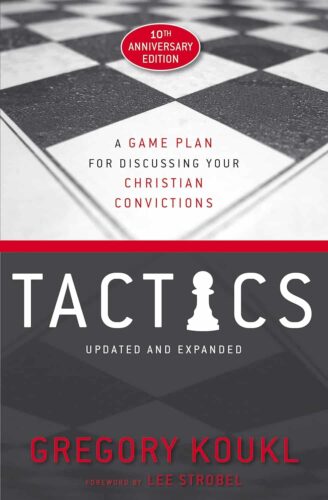 How to Defend Your Convictions
How to Defend Your Convictions
Author: Gregory Koukl
Have you ever known the answer to something, but frozen when someone asked you? Real conversations don’t invite preaching. They’re often fleeting, relationship defining moments, and your audience may not be nice enough (or interested enough) to let you work through your twenty-minute, ten-step spiel. They may interrupt. They may expect a summary, not a discourse. They may be hostile or friendly or somewhere in between. In this evolving world of complicated moments between people, how do you defend your convictions without someone walking away mad? Does every question have to devolve into an argument, and who does that really benefit anyway? How do you succeed during these often surprise-attack conversational moments, coming away engaged instead of battle weary?
Gregory Koukl’s Tactics book is a must read for all Christians, and honestly for everyone. Koukl is respectful and empathetic, highlighting the importance of an approach that invites critical thinking and curiosity in equal measures. Most of it boils down to the “Colombo” tactic, where Koukl invites us to resist immediate responses (our desire to spill out all of our knowledge and ideas in a hodgepodge) and instead ask questions of our questioner: “why do you think that might be, why do you think I might believe that, why do you think Jesus said that,” etc. This invites the other person to fully engage in the conversation and to introspect on what they believe and why. In this way, you can gently probe for the real question, highlight contradictions and self-defeating worldviews, and have a true and respectful exchange of ideas.
As Koukl explains, asking return questions is also a way to defuse tension and animosity, engage the questioner, and stay in control of the argument. It’s a defensive tactic when you get the overly aggressive, anti-Christian person and a tactic for your questioner with purer intents, who is truly looking for an answer. This questioning tactic helps you gather information and reverse the burden of proof; it enables you to gently use questions to make a point, inviting you and your interlocuter to hone beliefs, explore a world of possibilities, and evaluate motives and emotions. Koukl likewise explains how to defend against someone using Colombo tactics on you (because turnabout is fair play, right?)
The second part of the book concentrates on finding the flaws (using questions!) and understanding views that self-destruct, that are unsupported, that contradict and destroy one another, etc. This section also talks about dealing with “steamroller” people who do not allow you to answer or respond and how to understand and interact with “expert” opinions.
Tactics is one of the best books I have ever read; I plan to read it multiple times. The examples and careful thoughts, the explanations and the warnings, are intelligent, well-reasoned, and presented with responsibility, respect, and compassion. It’s complicated, and yet simple. The tactics defined helps us keep from being blindsided while giving us the tools we need to explore the world around us and interact with people who think differently. Highly recommended.
– Frances Carden
Follow my reviews on Twitter at: https://twitter.com/xombie_mistress
Follow my reviews on Facebook at: https://www.facebook.com/FrancesReviews
- Book Vs Movie: The Shining - April 6, 2020
- Thankful For Great Cozy Mysteries - December 13, 2019
- Cozy Mysteries for a Perfect Fall - October 20, 2019

